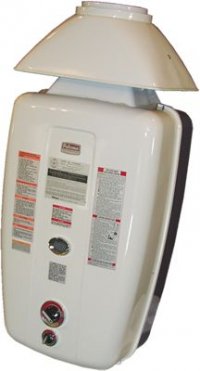Hello All,
There are a few Niagaras and a Nonsuch at my yacht club that have "Paloma" brand demand hot water heaters fired by propane. They were installed by the factory. If you haven't seen one of these units they are pretty nifty. They mount on a vertical surface and heat water directly as it is used. Exhaust is vented through a charlie noble in the deck just like a propane salon heater. The Paloma equiped boats all have propane fired salon heaters as well that utilize the same exhaust flue.
You should see where I am going with this as the benefit is heating for comfort, heating for water using the same fuel and sharing an exhaust flue. From a strictly space-saving issue the Paloma heater mounts on the bulkhead in the head and space is gained by removing the existing electric/coolant operated storage type water heater in the engine space.
On an older E38 like mine the Paloma would easily mount on the bulkhead and a salon heater like a Force 10, etc. could mount on the salon side of the same bulkhead making sharing of the exhaust flue.
The drawbacks AFAIK are the Paloma's are not supposed to be used on boats.... Never mind that Niagaras and others have had them installed at the factory and my limited research has not turned up any issues. Anyone have any input on these types of heaters? The added benefit is converting to propane would utilize the built-in lockers on the E38 and allow the same fuel for cooking, heating and heating water. Also since we intend to cruise propane is easier to find.
Sound like a good idea?
RT
There are a few Niagaras and a Nonsuch at my yacht club that have "Paloma" brand demand hot water heaters fired by propane. They were installed by the factory. If you haven't seen one of these units they are pretty nifty. They mount on a vertical surface and heat water directly as it is used. Exhaust is vented through a charlie noble in the deck just like a propane salon heater. The Paloma equiped boats all have propane fired salon heaters as well that utilize the same exhaust flue.
You should see where I am going with this as the benefit is heating for comfort, heating for water using the same fuel and sharing an exhaust flue. From a strictly space-saving issue the Paloma heater mounts on the bulkhead in the head and space is gained by removing the existing electric/coolant operated storage type water heater in the engine space.
On an older E38 like mine the Paloma would easily mount on the bulkhead and a salon heater like a Force 10, etc. could mount on the salon side of the same bulkhead making sharing of the exhaust flue.
The drawbacks AFAIK are the Paloma's are not supposed to be used on boats.... Never mind that Niagaras and others have had them installed at the factory and my limited research has not turned up any issues. Anyone have any input on these types of heaters? The added benefit is converting to propane would utilize the built-in lockers on the E38 and allow the same fuel for cooking, heating and heating water. Also since we intend to cruise propane is easier to find.
Sound like a good idea?
RT

